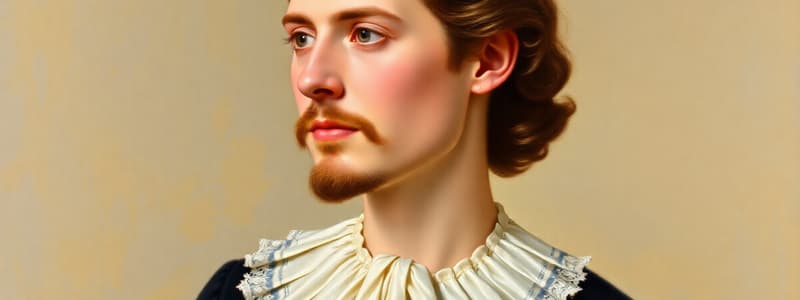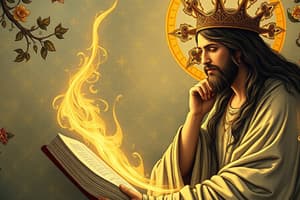Podcast
Questions and Answers
What was a primary motivation for wealthy Americans to invest in art, music, and literature during the Gilded Age?
What was a primary motivation for wealthy Americans to invest in art, music, and literature during the Gilded Age?
- To enhance the cultural education of the working class.
- To establish art schools and public libraries.
- To support struggling artists and musicians.
- To showcase their refined taste and wealth to guests. (correct)
John Singer Sargent was primarily known for his portraits of wealthy and prominent individuals.
John Singer Sargent was primarily known for his portraits of wealthy and prominent individuals.
True (A)
What art form is Louis Tiffany most known for?
What art form is Louis Tiffany most known for?
Stained glass
Antonín Dvořák's symphony, inspired by his time in America, is called 'From the ______ '.
Antonín Dvořák's symphony, inspired by his time in America, is called 'From the ______ '.
Match the following figures from the Gilded Age with their primary artistic contribution:
Match the following figures from the Gilded Age with their primary artistic contribution:
What was the significance of newspapers during the Gilded Age?
What was the significance of newspapers during the Gilded Age?
Ragtime combined classical music elements with African American music styles.
Ragtime combined classical music elements with African American music styles.
Which American president did John Singer Sargent paint a portrait of?
Which American president did John Singer Sargent paint a portrait of?
Joseph Pulitzer used his newspaper to raise money for the base of the ______ .
Joseph Pulitzer used his newspaper to raise money for the base of the ______ .
Which of the following best describes Winslow Homer's artistic focus during the Gilded Age?
Which of the following best describes Winslow Homer's artistic focus during the Gilded Age?
Flashcards
Portrait
Portrait
A picture of a person, popular among wealthy families during the Gilded Age to preserve memories.
John Singer Sargent
John Singer Sargent
An American portrait painter who spent much of his life in Europe, capturing the thoughts and feelings of his subjects, including famous Americans like John D. Rockefeller and Theodore Roosevelt.
Mary Cassatt
Mary Cassatt
An American artist known for her paintings of mothers and children, she studied art in Philadelphia and Paris.
Winslow Homer
Winslow Homer
Signup and view all the flashcards
Louis Tiffany
Louis Tiffany
Signup and view all the flashcards
Ragtime
Ragtime
Signup and view all the flashcards
Press practices
Press practices
Signup and view all the flashcards
First comic strips
First comic strips
Signup and view all the flashcards
Study Notes
- Art, music, and writing flourished during the Gilded Age.
- Wealthy Americans desired to fill their homes with art and music, and show off their libraries.
- Their wealth led to more attention to the finer things in life.
Art
- Portraiture was a popular art form.
- Wealthy families commissioned portraits to preserve the memory of family members.
- Portraits were expensive and required the subject to sit still for hours.
- John Singer Sargent was a successful American portrait painter who lived in Europe.
- Sargent captured the thoughts and feelings of his subjects.
- Sargent painted portraits of John D. Rockefeller and President Theodore Roosevelt.
- Mary Cassatt grew up in Pennsylvania and studied art in Europe.
- Cassatt's paintings often depicted mothers and children.
- Winslow Homer was known for painting scenes from everyday life.
- Homer's work included children at school and play, country life, and coastal scenes.
- Louis Tiffany created stained-glass objects.
- Tiffany's mosaics and lampshades decorated wealthy homes.
Music
- Americans enjoyed various styles of music during the Gilded Age.
- Edward MacDowell wrote classical piano music, including "To a Wild Rose."
- Antonín Dvořák, a composer from Hungary, taught music in America.
- Dvořák wrote a symphony called From the New World.
- "From the New World" premiered at Carnegie Hall in New York.
- Marching music was also popular.
- John Philip Sousa wrote marches in the 1890s.
- "The Stars and Stripes Forever" is still a popular song.
- Ragtime became popular in the late 1800s.
- Ragtime combined classical music with African American music styles.
- Scott Joplin, a Black composer, wrote many ragtime songs.
Writing
- The Gilded Age is named after a book of the same name co-written by Mark Twain.
- Mark Twain wrote novels about Tom Sawyer and Huckleberry Finn.
- Louisa May Alcott's novels Little Women and Little Men also rose to fame.
- Emily Dickinson wrote hundreds of poems.
- Very few people knew about her poems until after her death in 1886.
- Dickinson's poems are considered some of the greatest American poetry ever written.
Newspapers
- The press was powerful during the Gilded Age.
- People generally believed what they read in newspapers.
- Two New York newspapers became known for mixing fiction with news.
- Joseph Pulitzer and William Randolph Hearst owned the papers.
- They each aimed to sell the most papers
- They embellished stories to make them more exciting.
- Sometimes, false reports in the papers hurt people.
- Newspapers helped raise money for important causes.
- Pulitzer raised over $100,000 toward a stand for the Statue of Liberty.
- The first comic strips were also published in newspapers in 1896.
Studying That Suits You
Use AI to generate personalized quizzes and flashcards to suit your learning preferences.




